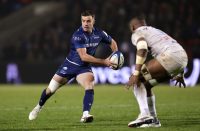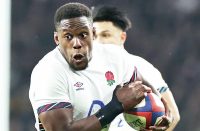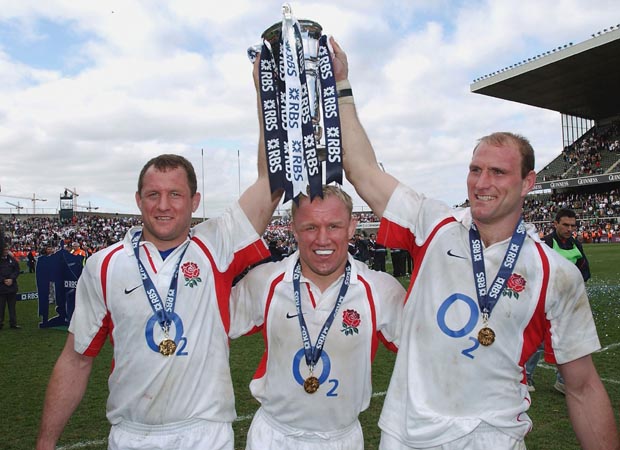 Neil Back wants to accentuate the positives for England in the week that the 2015 World Cup countdown began in earnest. However, not at the cost of being honest, and, with a year to go Back says Stuart Lancaster‘s squad have just 12 Tests in which to make the transition from being good to world class.
Neil Back wants to accentuate the positives for England in the week that the 2015 World Cup countdown began in earnest. However, not at the cost of being honest, and, with a year to go Back says Stuart Lancaster‘s squad have just 12 Tests in which to make the transition from being good to world class.
The 2003 World Cup-winning openside believes that the host nation are already genuine
contenders, but that to take the step-up required to be world-class and win the Webb Ellis Cup at Twickenham on Saturday, October 31 next year, Lancaster and his coaching crew have an inescapable duty. Namely, to nail their selection colours to the mast this autumn.
Back says this includes selecting a linking No.7 who can provide the continuity that England must develop if their world champion aspirations are to be realised.
If there was a prize for the smallest Test forward with the biggest influence over the last half century the super-fit Back, who won 66 England caps and five for the Lions (1994-2005), would win it hands down. Back had a heart of oak, and was as tough and resilient as knotted wood, but his hands were soft enough to make him into one of the greatest openside link-men the game has known. That’s why his words resonate so strongly.
Back says that the big questions over Chris Robshaw‘s captaincy, and his place in the back-row – and over virtually every other combination in the team from the front row to the back-three – have to be resolved before England play New Zealand on November 8.
He argues that failure to do so will deprive England’s 2015 hopefuls of the time for combinations to bed-in, and for cohesion and team-work to become second nature.
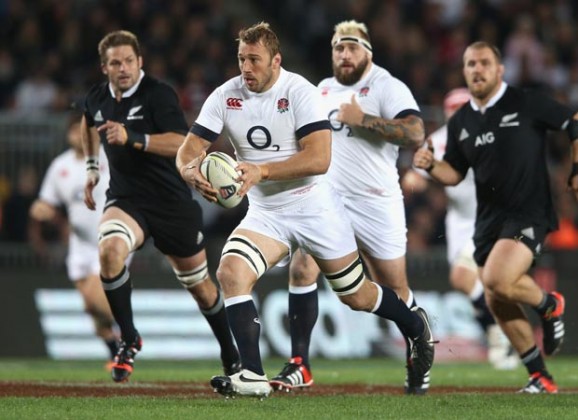
“When you are a learner driver you think about everything, and then later it becomes automatic behaviour. This England team is still learning to drive, but good combinations give you that automatic element – and that helps you to go from good to great.”
He continues, “This autumn, with 12 games to go, we must play all our leading players together. By 2003 our communication had changed from verbal to visual. We became instinctive in our behaviour – we could second-read each other. Compared to that this team is not established. However, they are at a point where they can pick on form this autumn and then go with the combinations from then on.”
On the plus side Back believes that the agreement with Premiership Rugby postponing the naming of the EPS squad from July until October is a big bonus. “It is the right time because if you select it early it is a comfort blanket for the players. Now, they have to put a marker down which says, ‘I’m the form player, you must pick me’.”
He adds: “We are well into our season, and the blips should have been ironed out by November. We should be right on it. There are no excuses this autumn.”
However, Back does not stint in his praise of what England have achieved recently. “Lancaster has got 95 per cent of it right. He has developed an England side with a solid set-piece and defence, and last season we saw an improved attacking philosophy. But it is the next five per cent, which is the difference between a good and a great team, that is the hardest gain to make.”
He adds, “If you asked anyone to pick their starting side in 2003, they would have come up with a maximum of 16 or 17 names. Now, you would have at least 25 – and I’m being kind. Many pundits would pick different combinations in all areas of the team, whether forwards or backs. Those question marks tell me that these combinations have not had enough time together. In the pack there are question marks over who are the leading lights, and the captaincy and the back-row is still up for grabs.”
Back highlights the differences between Robshaw’s status, after handing on the Harlequins captaincy, and Martin Johnson’s.
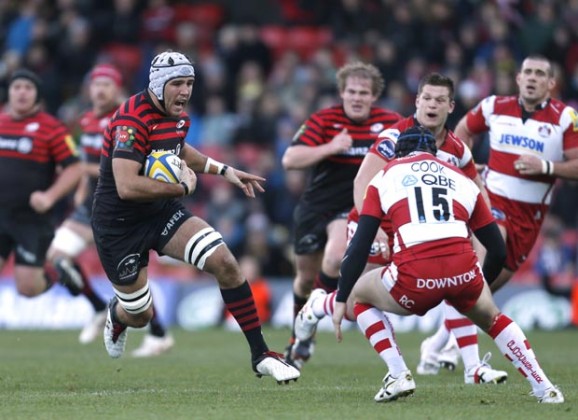
“Johnno was relieved of the Leicester captaincy by Dean Richards so that he could concentrate on England, and I took over. But you cannot compare Martin Johnson, who was world class as a second row and as a leader, with Chris Robshaw. To start with, Robshaw is not certain of his place. Robshaw has done a fantastic job with Lancaster in creating a good environment – and whether he is in the World Cup or not, he will have contributed to that. However, there are question marks over his captaincy and his position, and that never happened with Johnno. No-one questioned his credentials.”
Back’s focus shifts automatically towards the back-row, and the early-season statements made in the No.7 shirt by Wasps skipper James Haskell and his Saracens counterpart Will Fraser.
“Fraser is coming through strongly and Haskell’s been playing out of his skin. Haskell is out on his own in terms of effectiveness over the ball. It could be that for the England backrow to get over the line next year you might have them as left and right flankers, or open and blind.”
However, Back identifies finding a flanker whose main job is continuity, like his was, as the main priority: “Whether that’s clearing opponents off the ball and making sure it’s available, or passing to someone better placed to carry and making sure you are there in support to get a second touch, it’s crucial. Right now everyone’s thinking ‘shall I pass the ball, or run it’ – and by the time they’ve thought about it, it’s too late!
“If you look at New Zealand, their players always keep in motion and look for a second touch. They know that if you’re on the floor you’re out of the game, so they are quick to get back into the game, and quick in running supporting lines.”
He adds: “I don’t buy all these carrying stats and visits to breakdowns in assessing openside flankers. It’s continuity that counts. An Aussie coach once asked me why my off-loading stats were so high, and I told him that it was because I wanted to put better carriers than me into holes. After all, who would you want running at the opposition, Lawrence Dallaglio or Richard Hill, or me at 90kg?”
Back says there must be clarity in the back-row. “The coaches need to define the roles clearly – and above all they must decide who is that continuity man, the link. A No.7 has to be able to pass like a scrum-half, and stand at 10, 12, 13 or blindside wing and know how to run the moves. He has to be world-class in contact and in distribution.”
His own attention to detail is still imprinted on his mind a decade after he retired: “My job was to be up in support, and I made it a part of my preparation to look at our England backs and know their lines of running, their preferences in terms of which foot they stepped off, and which side they favoured. If I close my eyes now I can still see them.”
The pressure the 2003 squad put on themselves to perform to the highest standards was always said to be greater than the expectations from outside the group, from the media and the public, and one Back anecdote illustrates the point.

“I’ve watched the 2003 World Cup final just once, seeing it for the first time exactly 10 years later when I was invited to do a question-and-answer at a dinner. Watching it I was aware that I made two poor passes – and, although I answered the questions, for a long while those passes were all I could think about. I eventually let it go, reminding myself that we did win the game.”
He says that winning is non-negotiable for Lancaster’s England this autumn, and beyond.
“The biggest difference between now and 2003 is that this tournament is in England, and home advantage is huge. England have to beat New Zealand, South Africa and Australia – all ranked above them right now – and then beat all the Six Nations teams ranked below them by winning a Grand Slam. It’s a big ask, but it is also crucial because England will have to win seven games on the bounce to win the World Cup again. There are only two teams which have won seven games on the bounce in recent years, and that’s New Zealand and South Africa.”
Yet, Back says that there is hope, and that the game in Paris last season was a watershed for Lancaster’s side despite second-half bench decisions proving costly. “It showed a positive change of thinking, because England were looking for off-loads. Some of the fans around me groaned when passes went to ground, but I thought it was brilliant. There was ambition in attack, and by the end of the Six Nations those passes were expected, and they were sticking.”
Now he advocates the same ambition in selection. “The England coaches have got to go with their instincts now – and then live with it. That’s what they are paid for. The last thing anyone wants is for them to look back in a year’s time and say we should have gone with so-and-so. Having made those decisions in October, they have to give the team time to grow together.”
In Neil Back’s view once the hard selection calls have been made it’s all about consistency and continuity – and he has expert credentials in both.



